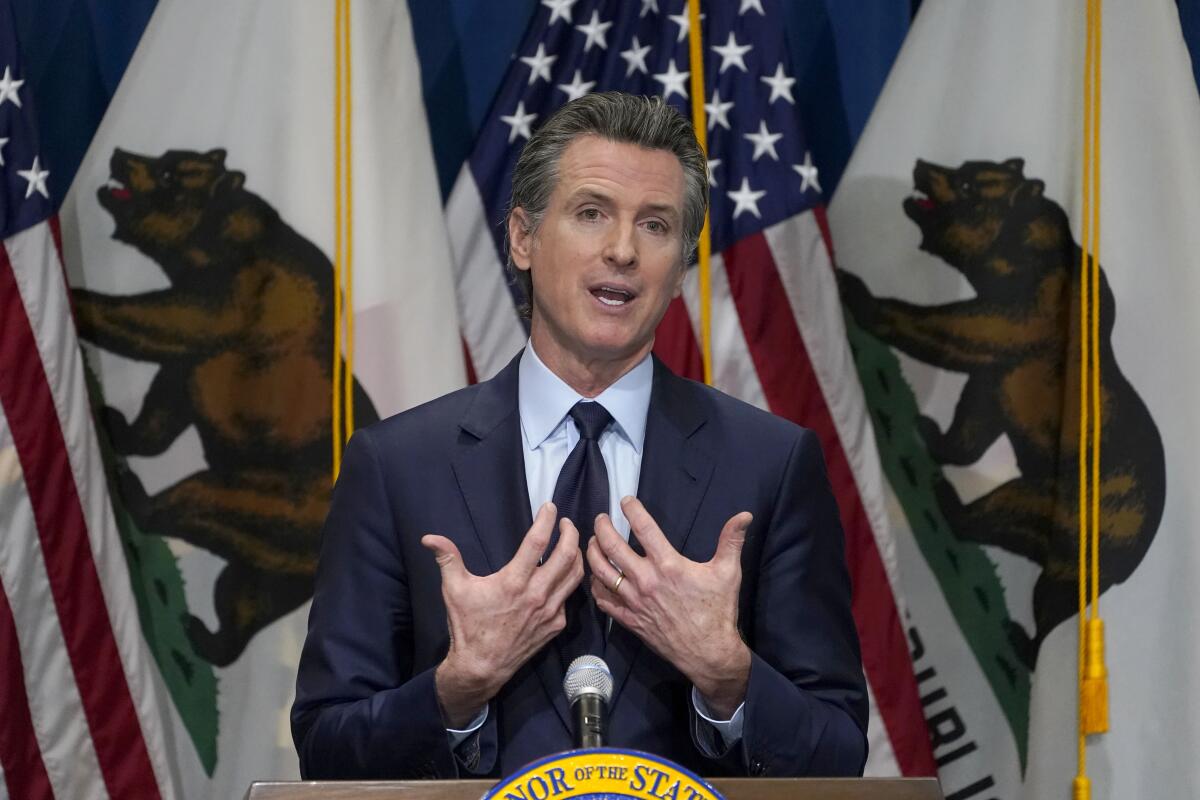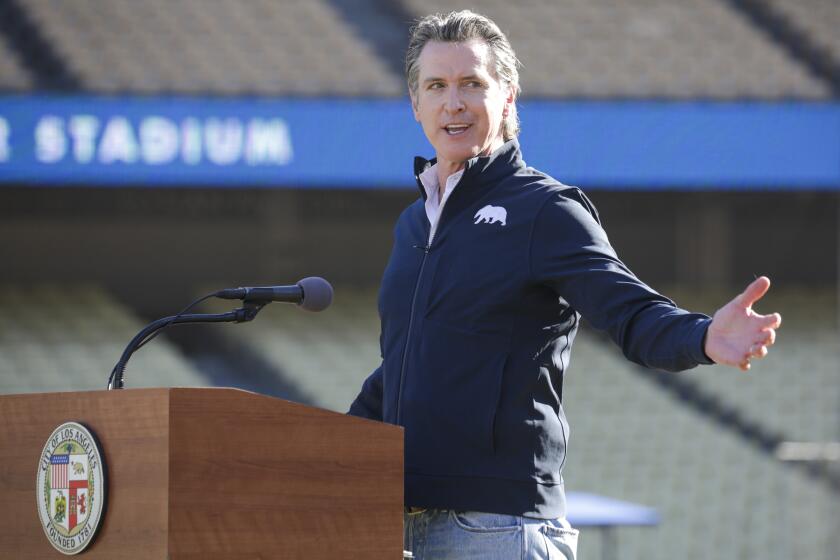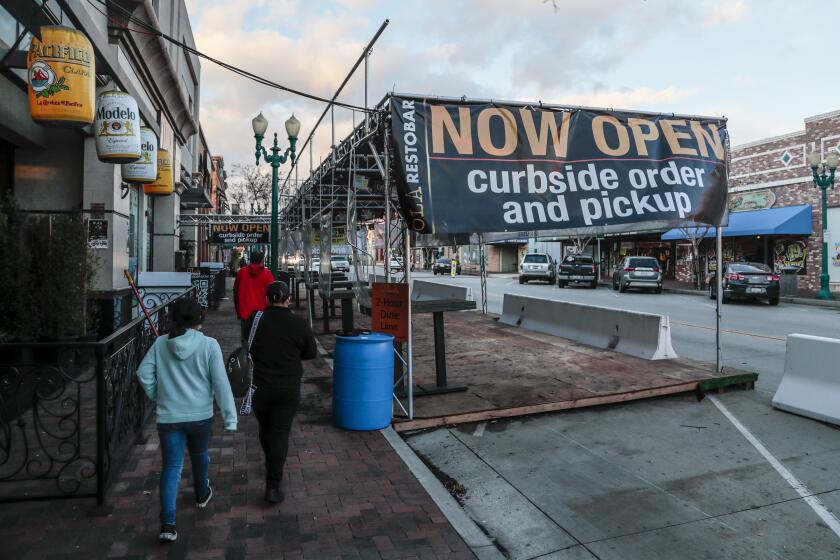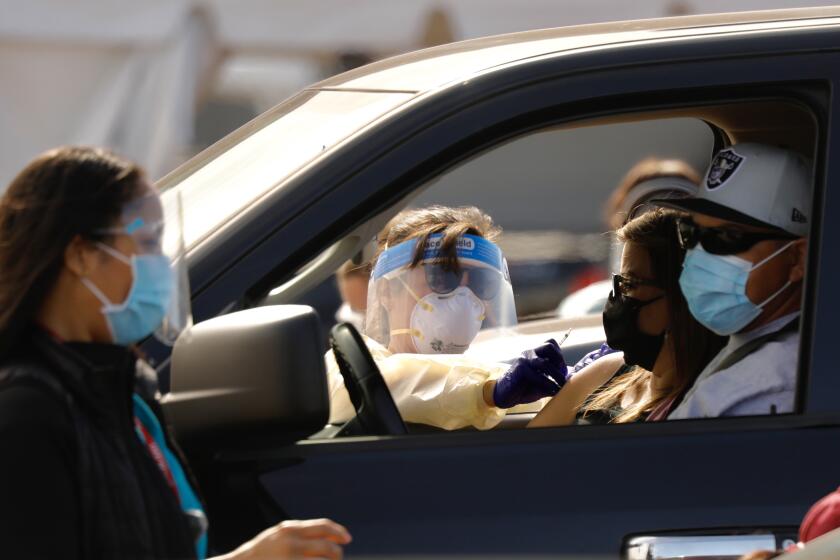Newsom under fire from Democrats over COVID-19 response as he faces GOP-led recall campaign

- Share via
SACRAMENTO — There’s an unspoken rule in politics: Don’t publicly criticize your party’s leader.
But more California Democratic lawmakers and allies of Gov. Gavin Newsom are beginning to break it as frustration grows nearly a year into the COVID-19 pandemic.
“It’s like he’s putting us out to die,” said Sandra Díaz, vice president and political director of SEIU United Services Workers West, which represents janitors, security personnel and other essential workers who were recently removed from the state’s vaccine priority tiers by the Newsom administration. “It’s more important for us as a union to see this get better, no matter who that upsets.”
California Republicans have consistently blasted Newsom’s actions on the coronavirus as they wage a campaign to oust him from office. Yet increasing and loud disapproval from those typically aligned with the governor in response to his ever-shifting course on vaccine policy and regional stay-at-home orders, his inability to reopen schools and poor communication on major decisions has exposed a vulnerability for Newsom. With the potential of a statewide recall election looming, the unhappiness expressed by Democratic officials and interest groups could be an indication of dissatisfaction among his base.
The presence of a campaign gathering signatures to force a special election in the fall has placed enormous pressure on Newsom and left his frustrated allies in a no-win situation. They can continue to privately voice frustrations over COVID-19 response to an administration they say doesn’t listen, or publicly call out Newsom and run the risk of adding fuel to the recall campaign.
Critics say Newsom frequently hypes announcements and keeps local government and public officials in the dark about his coronavirus plans.
Some like Díaz feel the governor’s changing positions on his vaccine plan, which has de-prioritized many groups of essential workers who would have otherwise been toward the front of the line, have life and death consequences for their members.
Others are repeating many of the same concerns they’ve voiced throughout the pandemic and during Newsom’s first year in office — that the governor and his inner circle often make far-reaching decisions without taking into account the concerns of affected parties. Several lawmakers publicly criticized Newsom on Twitter last week for again giving them little notice before rescinding the regional stay-at-home orders Monday, rules put in place in December to slow the spread of the coronavirus.
Assemblywoman Laura Friedman (D-Glendale) said that while the Newsom administration has started to collaborate more frequently with the Legislature in recent months, many legislators have been left in the dark regarding the governor’s response throughout the pandemic.
A small group of legislators was warned at 6 p.m. Jan. 24 that the Newsom administration would lift the stay-at-home restrictions — just a couple of hours before news broke of the decision.
“I would have loved to have a better understanding of the rationale behind a lot of these decisions and the data behind them, and I think the public should know that data as well,” Friedman said. “It would make people feel much more comfortable with the different executive actions that are handed down and the different orders. I would have loved it if months back, we really understood what was coming and that the public understood a little bit more.”
Friedman said she’s not concerned that, by criticizing the governor’s actions, she could be boosting the recall campaign against Newsom. She opposes the recall and supports her fellow Democrat, but said she also has a responsibility to “voice the concerns of my community.”
“I think that what’s going to hurt Newsom in the end more than anything is not people speaking out, but him failing,” Friedman said. “So the best way that I can keep him from being recalled is to help him succeed.”
Kimberly Nalder, a political scientist at Cal State Sacramento, said recall proponents could try to tap into discontent among some organized labor groups, Democratic lawmakers and others, but noted that will be extremely difficult because many perceive efforts to oust Newsom solely to be the work of far-right groups. If that perception changes, however, Newsom’s base of support could erode.
“People want someone to blame for how uncomfortable their lives are right now,” Nalder said.
The risk of reopening California as new coronavirus strains spread and the vaccine rollout slows.
Newsom’s political advisors and the California Democratic Party have attempted to paint the recall as a partisan effort funded and led primarily by extremists. Though the early roots of the recall effort have ties to fringe groups and supporters of former President Trump, the effort has since been adopted by mainstream California Republicans who formed their own parallel campaign led by some of the same strategists who helped oust former Gov. Gray Davis in 2003.
Michael Trujillo, a Democratic strategist who has helped run campaigns for former Los Angeles Mayor Antonio Villaraigosa, said it’s accurate for the governor to brand the recall backers as highly partisan, or some as extremists. But he said that message is undercut when the left is voicing criticism too.
“I think a lot of rank-and-file Democrats see Gavin Newsom as a combination of Charlie Brown and Lucy, where he wants to kick the football but he pulls it out himself before he can do it,” Trujillo said.
Regardless of its prospects, an active recall campaign also opens up Newsom’s every decision to speculation that it was driven in part by an instinct for self-preservation. The governor’s political motivations have been questioned on actions related to issues that are both critical to California’s pandemic response and top of mind to voters.
Karen Smith, a communicable disease physician and former director of the California Department of Public Health, said the governor could avoid the perception that he has been influenced by political concerns if, in the days leading up to future announcements, he clearly articulates the reason why his administration is considering a major change.
“This guy’s worst problems, even including politically, come from the fact that they just don’t communicate well and they certainly don’t take the time to communicate in a way that introduces people to something, gives them more information, and then you effectuate it,” Smith said of Newsom’s administration. “It’s crazy, because that’s sort of basic and how you talk to people when you want to get them on your side.”
Democratic strategist Katie Merrill said the criticism of Newsom’s actions by labor groups and other political allies was inevitable because of the gravity of the COVID-19 pandemic and the dramatic impact it has had on the lives of Californians. She likened the situation to the governor having to respond to a 7.5-magnitude earthquake in Los Angeles every day.
She doesn’t believe, however, that the dissension will boost a Republican-led recall campaign in a state where voters overwhelmingly approve of Democratic policy positions.
“He’s going to get criticism from all sides with a lot of the decisions he’s making. But I don’t think for most voters this is going to rise to the level of removing him from office,” Merrill said. “I think that kind of chaos, added to the chaos we’re experiencing right now and the stress that everyone’s experiencing right now, is not what the majority of California voters want.”
Merrill is also skeptical that the recall effort will qualify for the ballot, despite the claims of its supporters.
Backers of the effort must collect nearly 1.5 million valid signatures of registered voters by March 17 to qualify for a special statewide election, which would be only the second recall election against a governor in California history. As of Jan. 6, recall petitioners had submitted 723,886 signatures and 410,087 had been verified.
Even if the recall does qualify for the ballot, the circumstances in California will almost assuredly be very different in the fall, when voters would be asked to decide the issue.
“If kids are back in school, 75% of the population is vaccinated and people are moving freely, it will be a very different political situation,” Merrill said.
But some who feel that they’ve been ignored by the governor’s policies may be less forgiving.
“What it feels like to me is that the governor is responding to political pressure,” said Andy Imparato, executive director of Disability Rights California, who added that he believes Newsom is only addressing concerns of groups with the most power.
Several organizations that advocate for people with disabilities and participate in the state’s Community Vaccine Advisory Committee have been trying for weeks to ensure that those at high risk of contracting COVID-19 or dying from the virus are in a priority category for vaccinations.
Imparato said many people with disabilities are at greater risk, including those who have caregivers shuffle into their homes every day, a point he said he didn’t feel the state was considering.
“Last week two of us got to the point where we threatened to resign because we were so frustrated,” he said of his work with the advisory committee.
Only then did the state finally tell his group of advocates that people with disabilities that increase their risk for serious illness from COVID-19 would be considered among those who would be prioritized for the vaccine as part of the administration’s promise to focus on equity, he said.
“We’re feeling like we have to get more aggressive, we have to get louder, we have to organize and mobilize, and we need to point to what other states are doing,” Imparato said. “I don’t think Gov. Newsom at the end of the day is going to want to be known as the governor who was behind a bunch of Republican governors in trying to save the lives of people with disabilities.”
On Monday, the governor announced at a news conference that the state would switch to prioritizing vaccinations based on age after people 65 and older, healthcare workers, first responders, food and agriculture workers, teachers and school staff are inoculated.
The change means that other essential workers, such as janitors, transportation workers, security guards and employees at shelters who continue to report to work in-person every day would no longer be prioritized for the life-saving vaccine. Instead, they will be vaccinated at the same time as others in their age groups, many of whom have been able to work from home with much lower risk. The state so far hasn’t addressed whether those under 65 who have preexisting conditions that put them at greater risk for COVID-19 will be prioritized for vaccines.
Advocates for some essential workers and people with disabilities express concern that those groups may now have to wait longer to get vaccinated.
Before announcing the decision, the Newsom administration discussed the idea of moving to an age-based system during a recent meeting of the Community Vaccine Advisory Committee. Administration officials have argued that the change will allow providers to vaccinate people more quickly than if they continued to adhere to the state’s original, more complex system that prioritized people primarily by occupation and preexisting health conditions.
The response has largely been negative. Many in the committee pointed to the reality that Black and Latino workers have been disproportionately affected by the coronavirus and said the change would leave more of them unprotected.
“I understand there’s a recall happening and that there has been significant flaws in the rollout of vaccines,” said Díaz of SEIU. “We can’t play politics with people’s lives and frontline workers and Latino workers and Black workers are also part of the state and [Newsom] has an obligation to make policy and guidance that respects them. The decision that he made will cost lives and those communities and those workers will not forget that they were put in the line of fire and they were overseen and left behind time and time again.”
Democratic political consultant Steve Maviglio said Newsom’s decisions on vaccinations, reopening schools and other pandemic-related issues make this a very perilous time for the governor.
Maviglio served as press secretary for Gov. Gray Davis, who was recalled from office in 2003 after coming under fire for his slow response to the 2000-01 energy crisis in California, which triggered rolling blackouts across the state and near financial ruin for utilities. He was also criticized for his administration’s handling of the recession resulting from the collapse of the dot-com industry.
Newsom is in a much stronger position politically than Davis was when he was ousted, Maviglio said. Davis, a centrist Democrat, came under constant fire from both the left and the right. Among other clashes during his tenure as governor, Democrats criticized his budget decisions and Republicans ripped him for raising the car tax.
“There’s no easy way out there with a crisis of this magnitude. I mean, he has to be very careful because there are a lot of landmines left that he could step on,” Maviglio said. “It’s a dangerous time because some of these groups might leverage his vulnerability for their advantage.”
More to Read
Sign up for Essential California
The most important California stories and recommendations in your inbox every morning.
You may occasionally receive promotional content from the Los Angeles Times.


















